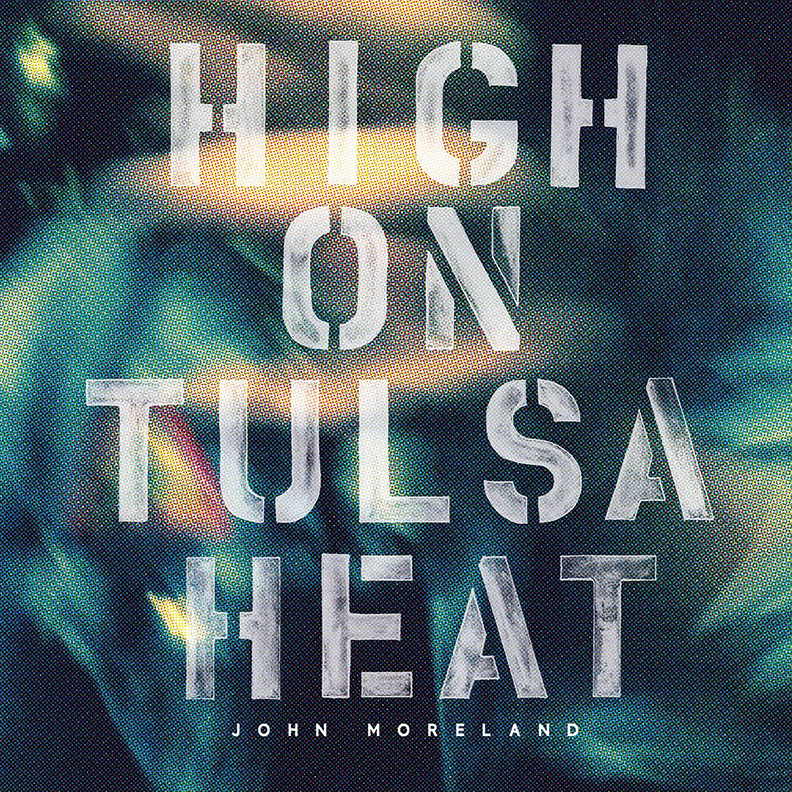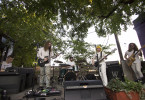John Moreland
High on Tulsa Heat
(Thirty Tigers)
B+
John Moreland’s intimate and affecting brand of folk is beloved by nearly anyone eager enough to seek it out, including a certain cable news anchor and whoever coordinates the music for Sons of Anarchy. It’s easy to see why; like many of the best songwriters, the Tulsa native’s candidly expressive lyrics carry with them a torrent of emotional unrest. But as heavy-handed as the subject matter often is, the allure of his finger-picked melodies and restrained-yet-thunderous vocal delivery keep it from feeling burdensome. This sparse and to-the-point instrumentation teems with rarified warmth, standing in contrast to the complexity of his words, and the usual barriers that impede a glimpse into a man’s soul are thus virtually nonexistent.
In other words, Moreland’s most brooding and powerful songs are his most musically bare. He began to embrace this less-is-more idealism — albeit not fully — on 2013’s In the Throes, and even more so in recent live performances. Efforts like “Blacklist” and “3:59 AM” found Moreland most in his element, any instrument not named Acoustic Guitar content to take a backseat as his words assume the forefront. And much of High on Tulsa Heat, Moreland’s third and best studio album, succeeds for these same reasons, emphasizing the intangibility of poetic lyricism over more grounded and traditional musical ideals.
About half the album features a supporting cast — John Calvin Abney, Kierston White, and Camille Harp, among others — but even the more robust accompaniments feel relatively subdued. Tracks like “Heart’s Too Heavy” and “Losing Sleep Tonight” embody this more somber, inward-focused tone, with melodic flourishes designed to enhance a song’s potency rather than detract from it. In the bridge of the title track — the record’s final and most uplifting effort — the band acquiesces to reveal nothing but a soft acoustic strum and a lyrical gut-punch (“We got wrecked on love and the heavens above/ Now we’re back on broken ground”), only to surge back into the fray with a glistening instrumental chorus.
However, it’s still the album’s sparsest offerings that carry the heaviest weight. Opener “Hang Me in the Tulsa County Stars” evokes Dave Van Ronk’s “Hang Me, Oh Hang Me,” but with a longing for spiritual connection at its core (“If I could make you feel the way you make me feel/ I’d set ablaze to secrets we’d concealed”). “Cherokee” — perhaps the most melodically rich moment in Moreland’s catalog — smothers with delicate guitar plucks, its harmonies dueling as if to see which can approach the higher musical sanctuary. Both songs exemplify how fragile words often resonate fullest through equally fragile instrumentation. And while it’d be unfair to ask for an album of such consistently devastating highs, they are the moments that come closest to evoking the same feelings held by Moreland himself.
There’s a pervading sense throughout High on Tulsa Heat that Moreland has a transcendent, genre-defining work within him somewhere. While the album’s full-band offerings fit too snugly within the broader folk-rock spectrum to be considered wholly individualized, they’re still strikingly well-written and stand toe-to-toe with some of the genre’s best. This is a record whose fire burns in a way that cares not whether it’s extinguished, just that you see and feel its incandescent light.





